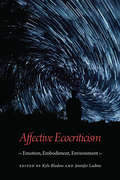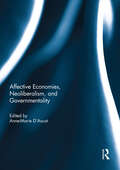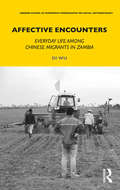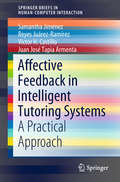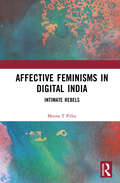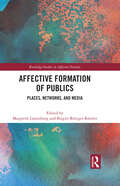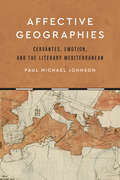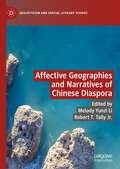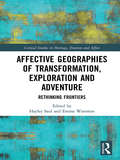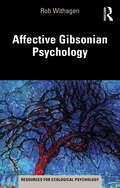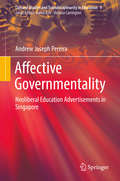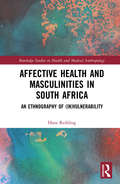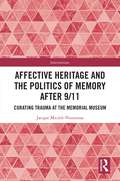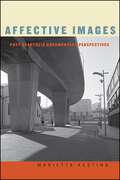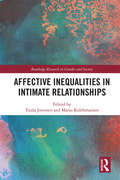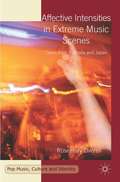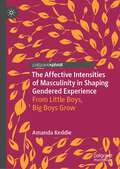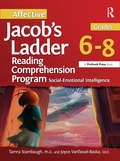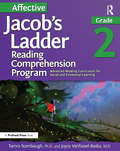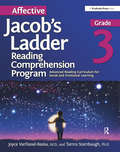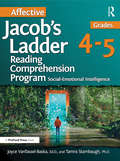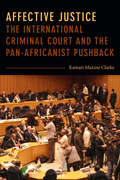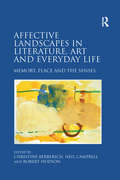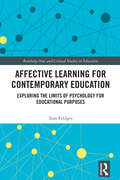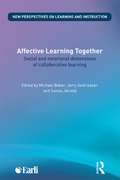- Table View
- List View
Affective Ecocriticism: Emotion, Embodiment, Environment
by Kyle Bladow Jennifer LadinoScholars of ecocriticism have long tried to articulate emotional relationships to environments. Only recently, however, have they begun to draw on the complex interdisciplinary body of research known as affect theory. Affective Ecocriticism takes as its premise that ecocritical scholarship has much to gain from the rich work on affect and emotion happening within social and cultural theory, geography, psychology, philosophy, queer theory, feminist theory, narratology, and neuroscience, among others. This vibrant and important volume imagines a more affective—and consequently more effective—ecocriticism, as well as a more environmentally attuned affect studies. These interdisciplinary essays model a range of approaches to emotion and affect in considering a variety of primary texts, including short story collections, films, poetry, curricular programs, and contentious geopolitical locales such as Canada’s Tar Sands. Several chapters deal skeptically with familiar environmentalist affects like love, hope, resilience, and optimism; others consider what are often understood as negative emotions, such as anxiety, disappointment, and homesickness—all with an eye toward reinvigorating or reconsidering their utility for the environmental humanities and environmentalism. Affective Ecocriticism offers an accessible approach to this theoretical intersection that will speak to readers across multiple disciplinary and geographic locations.
Affective Economies, Neoliberalism, and Governmentality
by Anne-Marie D’AoustAdvanced capitalism is characterized by a level of symbolic production that not only results in a dematerialization of labor, but also increasingly relies on highly emotional components, ranging from consumption desire to workforce management. Feelings as varied as love, anger, and desire are integral to neoliberal processes, though not in unproblematic and monolithic ways. Whereas some accounts decry capitalism’s hold on the emotional realm, as the commodified search for soul mates through online dating sites or Starbucks’ promotion of fair-trade coffee suggest, others counter that emotions represent a privileged site of resistance to market rationality. Relying on different case studies ranging from drone strikes, the 2008 economic crisis in Ireland, and marriage migration management, this volume builds on this productive tension between subjection and resistance through the lenses of the concept of governmentality. Developed by Michel Foucault, governmentality sheds light on the ways in which economic and political life are now being managed through logics of security and economic calculations. This volume explores how individuals might become emotionally attached to regimes of power that are detrimental to them, how neoliberal processes are concomitant with the valorization of certain emotional dispositions, and how affective economies might provide a site of resistance. This book was published as a special issue of Global Society.
Affective Encounters: Everyday Life among Chinese Migrants in Zambia (LSE Monographs on Social Anthropology)
by Di WuAgainst the background of China's rapidly growing, and sometimes highly controversial, activities in Africa, this book is among the first of its kind to systematically document Sino-African interactions at the everyday level. Based on sixteen months of ethnographic fieldwork at two contrasting sites in Lusaka, Zambia—a Chinese state-sponsored educational farm and a private Chinese family farm—Di Wu focuses on daily interactions among Chinese migrants and their Zambian hosts. Daily communicative events, e.g. banquets, market negotiations, work-place disputes, and various social encounters across a range of settings are used to trace the essential role that emotion/affect plays in forming and reproducing social relations and group identities among Chinese migrants. Wu suggests that affective encounters in everyday situations—as well as failed attempts to generate affect—should not be overlooked in order to fully appreciate Sino-African interactions. Deeply researched and with rich ethnographic detail, this book will be relevant to scholars of anthropology, international development, and others interested in Sino-African relations.
Affective Feedback in Intelligent Tutoring Systems: A Practical Approach (Human–Computer Interaction Series)
by Samantha Jiménez Reyes Juárez-Ramírez Victor H. Castillo Juan José Tapia ArmentaAffective components are as important as cognitive components in tutoring assisted learning process. Feedback from tutors is essential in keeping students motivated. Affectivity and motivation are also significant in computer-based tutoring systems. However, several educational frameworks do not include this kind of interaction between students and tutoring systems. In those cases, the students learning interest and motivation to learn could be negatively affected, and student profits from the system could be impoverished. This is why tutoring systems need to provide direct and affective interaction with students; it can encourage them and increase the motivation to learn. This book introduces a broad range of topics in affective learning in computer-based systems. The text offers a deep conceptual background, covering relevant concepts of affectivity, feedback and motivational components in learning environments. It describes the design of a proposed model for providing affective feedback, the mathematical validation of the conceptual model and its implementation. Moreover, it presents an analysis of the impact of the affective feedback on student motivation to learn. Finally, the book offers research perspectives of the impact and applicability of the affective feedback in computer-based tutoring environments. Affective Feedback in Intelligent Tutoring Systems can be used by human tutors who want to include motivational and affective elements in the learning process, researchers in Human-Computer Interaction and Education and by software developers who want to develop learning systems using these elements.
Affective Feminisms in Digital India: Intimate Rebels
by Meena T PillaiThis book studies digital feminist activism in contemporary India. It provides a close and comprehensive analysis of the postmillennial digital moment in India which has given rise to new modes of women’s digital dissent. The volume examines how anti-rape narratives, Feminichy scandals, #MeToo movements, and menstrual activisms, amongst a host of other performative feminist dissent and their discursive medialities create ‘affective digital feminisms’ which both break with and continue the residual and emergent practices within feminisms in India. It looks at digital womanspeak from India and focuses on vernacular forms of dissent, through which the author aims to decolonize feminist imaginaries from their moorings in the West. The author explores new digital, cultural, and social geographies where politically untamed women use their precarity to unsettle deep sexist structures and mount a gendered critique of the political economy of the nation state. An important contribution to the study of feminism in India, the volume will be useful for students and researchers of gender and women’s studies, cultural studies, digital sociology, intersectional feminism, transnational feminism, digital humanities, and South Asian studies. It will also be appeal to readers interested in the history of women’s dissent in India.
Affective Formation of Publics: Places, Networks, and Media (Routledge Studies in Affective Societies)
by Margreth Lünenborg Birgitt Röttger-RösslerThis book offers an interdisciplinary analysis of current formations of publics that is informed by in-depth knowledge of affect and emotion theory. Using empirical case studies from contexts as diverse as India, Pakistan, Tanzania, and the Americas as well as Europe, the book challenges dichotomous distinctions between private and public. Instead, publics are understood as a relational structure that encompasses both people and their physical and mediatized environment. While each kind of public is affectively constituted, the intensity of its affective attunement varies considerably. The volume is aimed at academic readers interested in understanding the dynamic and fluid forms of contemporary formation of publics—be it digital or face-to-face encounters as well as in the intersection of both forms. This includes researchers from media and communication studies, social anthropology, theatre or literary studies. It is aimed at advanced students of these disciplines who are interested in the unfolding of contemporary publics.
Affective Geographies: Cervantes, Emotion, and the Literary Mediterranean (Toronto Iberic)
by Paul Michael JohnsonFor Miguel de Cervantes, to narrate a Mediterranean experience is to necessarily speak of an emotional experience. Affective Geographies takes as its point of departure the premise that literature is as influential in constructing the Mediterranean as are its geographic, climatic, or economic features. As the writer with the most vast and varied Mediterranean experience of his era, Cervantes is exceptionally well-suited for the critical task of recovering the literary Mediterranean. Engaging with the interdisciplinary fields of Mediterranean studies, affect theory, and the history of emotion, Paul Michael Johnson reads Cervantes’s texts alongside the affective structures that inscribe the Mediterranean as a space of conflict, commerce, expansion, and empire. In particular, he argues that Cervantes’s writing, with its uncommon focus on the Moorish, Islamic, and North African experience, can serve to realign misconceptions about the Mediterranean we have inherited today. Affective Geographies proposes that, with a more than four-hundred-year history of impacting the hearts and minds of readers, Cervantes’s works constitute a literary longue durée, ramifying beyond fiction to alter the popular imaginary and long-term cultural landscape.
Affective Geographies and Narratives of Chinese Diaspora (Geocriticism and Spatial Literary Studies)
by Melody Yunzi Li Robert T. Tally Jr.In various ways, Chinese diasporic communities seek to connect and re-connect with their “homelands” in literature, film, and visual culture. The essays in Affective Geographies and Narratives of Chinese Diaspora examine how diasporic bodies and emotions interact with space and place, as well as how theories of affect change our thinking of diaspora. Questions of borders and border-crossing, not to mention the public and private spheres, in diaspora literature and film raise further questions about mapping and spatial representation and the affective and geographical significance of the push-and-pull movement in diasporic communities. The unique experience is represented differently by different authors across texts and media. In an age of globalization, in “the Chinese Century,” the spatial representation and cultural experiences of mobility, displacement, settlement, and hybridity become all the more urgent. The essays in this volume respond to this urgency, and they help to frame the study of Chinese diaspora and culture today.
Affective Geographies of Transformation, Exploration and Adventure: Rethinking Frontiers (Critical Studies in Heritage, Emotion and Affect)
by Hayley Saul Emma WatertonCombining critical reflections from scholars around the globe as well as experiential records from some of the world’s most tenacious explorers, this book interrogates the concept of the ‘frontier’ as a realm of transformation, exploration and adventure. We discover the affective power of social, physical, spiritual and political frontiers in shaping humanity’s abilities to change and become. We collectively unpack the enduring conceptualization of the frontier as a site of nation-state identity formation, violent colonization, masculine prowess and the triumph of progress. In its place, this book charts a more complex and subtle emotional geography amidst an array of frontiers: the expanding human psyche that is induced under free-diving narcosis and tales of survival on one of the most technically difficult mountains in the world, ‘The Ogre’. Chapters consider solitude in the Sahara, near-death experiences in Tibetan Buddhism, the aftermath of a volcanic eruption in Bali, the Spanish Imaginary, snatched moments of sexual curiosity, and many more. This book will be of upmost importance to researchers working on theories of affect, the Anthropocene, frontier theory and human geography. It will be vital supplementary reading for undergraduates and postgraduates on courses such as Heritage Studies, Human and Cultural Geography, Anthropology, Tourism Studies and History.
Affective Gibsonian Psychology (Resources for Ecological Psychology Series)
by Rob WithagenAffective Gibsonian Psychology presents the first comprehensive ecological approach to our affective engagement with the environment, drawing on James Gibson’s new foundation of psychology. This book develops a unique theoretical framework, beginning with Gibson’s ecological approach, but also drawing on phenomenology, developmental systems theory, and the pioneering ideas of the psychoanalyst Alice Miller. The advanced perspective allows us to understand our emotional engagement with the environment, and the individual differences therein, without returning to the Cartesian assumptions that have plagued psychology since the 17th century. This book is intended to contribute to the ecological movement in psychology and is of interest to scholars working in the fields of Gibsonian psychology, affective science, phenomenology, clinical psychology, and (radical) embodied cognitive science.
Affective Governmentality: Neoliberal Education Advertisements in Singapore (Cultural Studies and Transdisciplinarity in Education #9)
by Andrew Joseph PereiraThis book investigates the subjectivities in education arising from the triumphant mobilisation of care as portrayed in educational advertisements, and provides a novel theory of affective governmentality based on empirical research on affect, neoliberalism, and governmentality. It also takes the bold step of encouraging the re-imagination of the central and pressing question of school marketisation in Singapore, and problematises the seemingly innocuous portrayals of care in light of neoliberal governmentality seeking to perform cultural work on preferred identities and subjectivities. Using a judicious selection of media artefacts, the book scrutinises the creation of emotional technologies through an ethic of caring, harnessing vulnerabilities and triumphalism. As such it not only equips readers to understand the role of emotional technologies but also offers a critical and alternative view of hope and aspirations for transforming society.
Affective Health and Masculinities in South Africa: An Ethnography of (In)vulnerability (Routledge Studies in Health and Medical Anthropology)
by Hans ReihlingAffective Health and Masculinities in South Africa explores how different masculinities modulate substance use, interpersonal violence, suicidality, and AIDS as well as recovery cross-culturally. With a focus on three male protagonists living in very distinct urban areas of Cape Town, this comparative ethnography shows that men’s struggles to become invulnerable increase vulnerability. Through an analysis of masculinities as social assemblages, the study shows how affective health problems are tied to modern individualism rather than African ‘tradition’ that has become a cliché in Eurocentric gender studies. Affective health is conceptualized as a balancing act between autonomy and connectivity that after colonialism and apartheid has become compromised through the imperative of self-reliance. This book provides a rare perspective on young men’s vulnerability in everyday life that may affect the reader and spark discussion about how masculinities in relationships shape physical and psychological health. Moreover, it shows how men change in the face of distress in ways that may look different than global health and gender-transformative approaches envision. Thick descriptions of actual events over the life course make the study accessible to both graduate and undergraduate students in the social sciences. Contributing to current debates on mental health and masculinity, this volume will be of interest to scholars from various disciplines including anthropology, gender studies, African studies, psychology, and global health.
Affective Heritage and the Politics of Memory after 9/11: Curating Trauma at the Memorial Museum (Interventions)
by Jacque Micieli-VoutsinasThis book critically examines the institutional curation of traumatic memory at the 9/11 Memorial Museum and its evocative power as a cultural storyteller. Memorial Museums are evocative spaces. Drawing on aesthetic practices deeply rooted in representing the ‘unrepresentability’ of cultural trauma, most notably the Holocaust, Memorial Museums are powerful, popular mediums for establishing cultural values, asking the visitor to contemplate "Who am I?" in relation to the difficult histories on display. Using primary data, this book poses important questions about the emotionally-charged site: what ‘moral lessons’ are visitors imparted with at the 9/11 Memorial Museum? Who is the cultural institution’s primary audience—the imagined community it reconstructs this traumatic history and safeguards its memories for? What does the National September 11 Memorial & Museum ultimately teach visitors about history, ourselves, and others? This work will be of interest to students and scholars in the areas of Human Geography, American Studies, Museum Studies and Public History, Cultural and Heritage Studies, and Trauma and Memory Studies.
Affective Images: Post-apartheid Documentary Perspectives (SUNY Press Open Access)
by Marietta KestingAffective Images examines both canonical and lesser-known photographs and films that address the struggle against apartheid and the new struggles that came into being in post-apartheid times. Marietta Kesting argues for a way of embodied seeing and complements this with feminist and queer film studies, history of photography, media theory, and cultural studies. Featuring in-depth discussions of photographs, films, and other visual documents, Kesting then situates them in broader historical contexts, such as cultural history and the history of black subjectivity and revolves the images around the intersection of race and gender. In its interdisciplinary approach, this book explores the recurrence of affective images of the past in a different way, including flashbacks, trauma, "white noise," and the return of the repressed. It draws its materials from photographers, filmmakers, and artists such as Ernest Cole, Simphiwe Nkwali, Terry Kurgan, Thenjiwe Niki Nkosi, Adze Ugah, and the Center for Historical Reenactments.This book is freely available in an open access edition thanks to Knowledge Unlatched—an initiative that provides libraries and institutions with a centralized platform to support OA collections and from leading publishing houses and OA initiatives. Learn more at the Knowledge Unlatched website at: https://www.knowledgeunlatched.org/, and access the book online at the SUNY Open Access Repository at <a href="http://hdl.handle.net/20.500.12648/7134 ">http://hdl.handle.net/20.500.12648/7134 .
Affective Inequalities in Intimate Relationships (Routledge Research in Gender and Society)
by Tuula Juvonen Marjo KolehmainenRaising to the challenge of how to grasp such forms of inequalities that are mediated affectively, Affective Inequalities in Intimate Relationships focuses on subtle inequalities that are shaped in everyday affective encounters. It also seeks to bridge a gap between affect theory and empirical social research by providing ideas and inspiration of how to work with affect in research practice. Presenting cutting-edge empirical studies on affect and intimate relationships, the collection - introduces alternative and novel ways of conceptualizing the workings of affect in intimate relationships - provides tools for tackling the subtle ways in which affectivity connects with power relations in intimate relations - develops innovative methodologies that provide better access to affect as an embodied experience A fascinating contribution to the interdisciplinary field of affect studies, Affective Inequalities in Intimate Relationships will appeal to advanced undergraduates and postgraduates interested in fields such as gender studies, queer studies and cultural studies.
Affective Intensities in Extreme Music Scenes
by Rosemary OverellAn ethnographic study of gender, place and belonging, Affective Intensities introduces readers to the embodied sensations, flows and experiences of being in extreme music scenes in Australia and Japan.
The Affective Intensities of Masculinity in Shaping Gendered Experience: From Little Boys, Big Boys Grow
by Amanda KeddieThis book tells a story of masculinity through the experiences of one boy, ‘Adam’. From four different studies and time periods, it tracks moments of significance in his life over a period of 20 years. These moments highlight the ways in which Adam is both drawn towards and away from a hegemonic masculinity of physical toughness, domination, competition and an opposition to ‘the feminine’. The book is set against the backdrop of a long history of contentious gender politics in Australia and globally but particularly responds to the renewed attention to the social construction of masculinities in the current #MeToo climate. Against this backdrop, nuanced and longitudinal accounts of boys’ and men’s experiences of masculinity are significant because they can offer insight into the complex bodily, social, economic, and historical forces that configure masculinities. Such understandings are important in our endeavours as those who educate, support and work with boys and men to transform gender inequalities.
Affective Jacob's Ladder Reading Comprehension Program: Grades 6-8
by Tamra Stambaugh Joyce VanTassel-BaskaThe Affective Jacob's Ladder Reading Comprehension Program uses a models approach to scaffold student learning and promote inquiry-based discussions of texts. This series of Jacob's Ladder: Focuses specifically on supporting advanced students' social-emotional needs.Includes high-interest reading selections in the following genres: short stories and media, poetry, and biographies.Moves students from lower to higher level skills of self-awareness, metacognition, and goal setting.Integrates reading comprehension and analysis skills with affective and social-emotional needs.Asks students to apply themes, character or real-life experiences, and lessons from texts to their own lives. New ladders were specially designed for this series and derived from relevant theories about empathy, risk and resilience, achievement motivation, and mindsets and practices for cultivating talent. The Affective Jacob's Ladder guides provide teachers with an explanation of the nature and substance of the theoretical constructs for each ladder. Also included are an overview of the goals and objectives of each ladder and suggestions for how to implement the ladders in the classroom in a way that supports students' academic and social-emotional needs at the same time. Optional Student Workbook Packs In addition to this teacher's guide, companion student workbooks are available for Short Stories and Media, Poetry and Song Lyrics, and Biographies, Essays, and Speeches. The student workbooks feature ample room for student responses and notes, make reviewing and providing feedback on student work easier than ever, provide students with an easy-to-use reference to use during discussions, and save time, as there is no need to reproduce student handouts.
Affective Jacob's Ladder Reading Comprehension Program: Grade 2
by Tamra Stambaugh Joyce VanTassel-BaskaThe Affective Jacob's Ladder Reading Comprehension Program uses a models approach to scaffold student learning and promote inquiry-based discussions of texts. This series of Jacob's Ladder: Focuses specifically on supporting advanced students' social-emotional needs. Includes high-interest reading selections in the following genres: short stories and media, poetry, and biographies. Moves students from lower to higher level skills of self-awareness, metacognition, and goal setting. Integrates reading comprehension and analysis skills with affective and social-emotional needs. Asks students to apply themes, character or real-life experiences, and lessons from texts to their own lives. New ladders were specially designed for this series and derived from relevant theories about empathy, risk and resilience, achievement motivation, and mindsets and practices for cultivating talent. The Affective Jacob's Ladder guides provide teachers with an explanation of the nature and substance of the theoretical constructs for each ladder. Also included are an overview of the goals and objectives of each ladder and suggestions for how to implement the ladders in the classroom in a way that supports students' academic and social-emotional needs at the same time. Optional Student Workbooks In addition to this teacher's guide, companion student workbooks are available for Picture Books, Short Stories and Media, and Poetry and Biographies. The student workbooks feature ample room for student responses and notes, make reviewing and providing feedback on student work easier than ever, provide students with an easy-to-use reference to use during discussions, and save time, as there is no need to reproduce student handouts.
Affective Jacob's Ladder Reading Comprehension Program: Grade 3
by Joyce VanTassel-Baska Tamra StambaughThe Affective Jacob's Ladder Reading Comprehension Program uses a models approach to scaffold student learning and promote inquiry-based discussions of texts. This series of Jacob's Ladder: Focuses specifically on supporting advanced students' social-emotional needs. Includes high-interest reading selections in the following genres: short stories and media, poetry, and biographies. Moves students from lower to higher level skills of self-awareness, metacognition, and goal setting. Integrates reading comprehension and analysis skills with affective and social-emotional needs. Asks students to apply themes, character or real-life experiences, and lessons from texts to their own lives. New ladders were specially designed for this series and derived from relevant theories about empathy, risk and resilience, achievement motivation, and mindsets and practices for cultivating talent. The Affective Jacob's Ladder guides provide teachers with an explanation of the nature and substance of the theoretical constructs for each ladder. Also included are an overview of the goals and objectives of each ladder and suggestions for how to implement the ladders in the classroom in a way that supports students' academic and social-emotional needs at the same time. Optional Student Workbook Packs In addition to this teacher's guide, companion student workbooks are available for Picture Books, Short Stories and Media, and Poetry and Biographies. The student workbooks feature ample room for student responses and notes, make reviewing and providing feedback on student work easier than ever, provide students with an easy-to-use reference to use during discussions, and save time, as there is no need to reproduce student handouts.
Affective Jacob's Ladder Reading Comprehension Program: Grades 4-5
by Joyce VanTassel-Baska Tamra StambaughThe Affective Jacob's Ladder Reading Comprehension Program uses a models approach to scaffold student learning and promote inquiry-based discussions of texts. This series of Jacob's Ladder: Focuses specifically on supporting advanced students' social-emotional needs.Includes high-interest reading selections in the following genres: short stories and media, poetry, and biographies.Moves students from lower to higher level skills of self-awareness, metacognition, and goal setting.Integrates reading comprehension and analysis skills with affective and social-emotional needs.Asks students to apply themes, character or real-life experiences, and lessons from texts to their own lives. New ladders were specially designed for this series and derived from relevant theories about empathy, risk and resilience, achievement motivation, and mindsets and practices for cultivating talent. The Affective Jacob's Ladder guides provide teachers with an explanation of the nature and substance of the theoretical constructs for each ladder. Also included are an overview of the goals and objectives of each ladder and suggestions for how to implement the ladders in the classroom in a way that supports students' academic and social-emotional needs at the same time. Optional Student Workbook Packs In addition to this teacher's guide, companion student workbooks are available for Short Stories and Media, Poetry, and Biographies, Essays and Speeches. The student workbooks feature ample room for student responses and notes, make reviewing and providing feedback on student work easier than ever, provide students with an easy-to-use reference to use during discussions, and save time, as there is no need to reproduce student handouts.
Affective Justice: The International Criminal Court and the Pan-Africanist Pushback
by Kamari Maxine ClarkeSince its inception in 2001, the International Criminal Court (ICC) has been met with resistance by various African states and their leaders, who see the court as a new iteration of colonial violence and control. In Affective Justice Kamari Maxine Clarke explores the African Union's pushback against the ICC in order to theorize affect's role in shaping forms of justice in the contemporary period. Drawing on fieldwork in The Hague, the African Union in Addis Ababa, sites of postelection violence in Kenya, and Boko Haram's circuits in Northern Nigeria, Clarke formulates the concept of affective justice—an emotional response to competing interpretations of justice—to trace how affect becomes manifest in judicial practices. By detailing the effects of the ICC&’s all-African indictments, she outlines how affective responses to these call into question the "objectivity" of the ICC&’s mission to protect those victimized by violence and prosecute perpetrators of those crimes. In analyzing the effects of such cases, Clarke provides a fuller theorization of how people articulate what justice is and the mechanisms through which they do so.
Affective Landscapes in Literature, Art and Everyday Life: Memory, Place and the Senses
by Christine Berberich Neil CampbellBringing together a diverse group of scholars representing the fields of cultural and literary studies, cultural politics and history, creative writing and photography, this collection examines the different ways in which human beings respond to, debate and interact with landscape. How do we feel, sense, know, cherish, memorise, imagine, dream, desire or even fear landscape? What are the specific qualities of experience that we can locate in the spaces in and through which we live? While the essays most often begin with the broadly literary - the memoir, the travelogue, the novel, poetry - the contributors approach the topic in diverse and innovative ways. The collection is divided into five sections: ’Peripheral Cultures’, dealing with dislocation and imagined landscapes'; ’Memory and Mobility’, concerning the road as the scene of trauma and movement; ’Suburbs and Estates’, contrasting American and English spaces; ’Literature and Place’, foregrounding the fluidity of the fictional and the real and the human and nonhuman; and finally, ’Sensescapes’, tracing the sensory response to landscape. Taken together, the essays interrogate important issues about how we live now and might live in the future.
Affective Learning for Contemporary Education: Exploring the Limits of Psychology for Educational Purposes (Routledge New and Critical Studies in Education)
by Tom FeldgesThis book dissects the relationship between the disciplines of Psychology and Education Studies to provide a new and critical perspective on the usefulness of psychological research and theory for educational purposes.Assuming that affective states form an important part of how humans relate to their environment, this book posits that the currently dominant cognitive approach to the field of psychology is unable to account sufficiently for this experiential reality of human life. Providing a philosophical investigation of this disparity, chapters offer an in-depth discussion of affective states for transformative learning, chart the journey of Psychology as an independent academic discipline, and engage classical learning theories in order to offer a broader understanding of complex, field-specific arguments, and engage readers from multidisciplinary backgrounds. Provoking a true paradigm shift in the field of Education Studies based on its own theoretical underpinnings, this book ultimately initiates a partnership between both disciplines to demonstrate a progressive and radical approach to the way we teach and think about the field of education studies.This cutting-edge book will be of relevance to scholars, researchers, and postgraduate students in the fields of Education Studies, educational psychology, the theory of education, and the philosophy of education more broadly. Senior professionals and academics who wish to expand their knowledge in relation to the international literature of this field would further benefit from this volume more broadly.
Affective Learning Together: Social and emotional dimensions of collaborative learning (New Perspectives on Learning and Instruction)
by Michael Baker Jerry Andriessen Sanna JärveläIn the twenty-first century, being able to collaborate effectively is important at all ages, in everyday life, education and work, within and across diverse cultural settings. People are increasingly linked by networks that are not only means for working and learning together, but are also ways of maintaining social and emotional support. Collaborating with others requires not only elaborating new ideas together, but also being able to manage interpersonal relations. In order to design and facilitate effective collaborative situations, the challenge is therefore to understand the interrelations between social, affective and cognitive dimensions of interactions in groups. Affective Learning Together contains in-depth theoretical reviews and case studies of group learning in a variety of educational situations and taught disciplines, from small groups working in the secondary school classroom, to teams of medical students and more informal working groups at university level. Contributors provide detailed analyses of the dynamics of interpersonal relations and affects, in relation with processes of meaning and knowledge elaboration, including discussion of: the variety of social learning situations and experiences; social identities in group learning; emotion, motivation and knowledge elaboration; conflict, arguments and interpersonal tensions in group learning. Bringing together a broad range of contributions from internationally recognised researchers who are seeking to broaden, deepen and integrate the field of research on collaborative learning, this book is essential reading for all serious students of contemporary educational research and practice.
